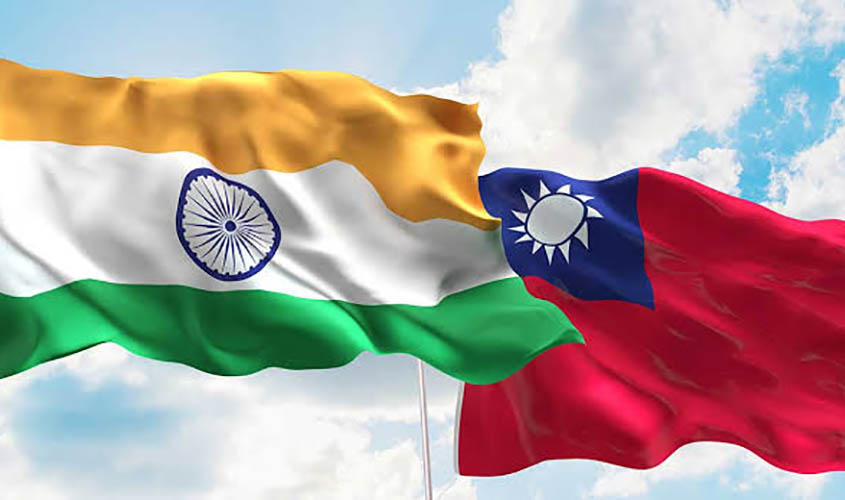Taiwan is gradually gaining confidence about investing in India.
In consonance with India’s “One China” policy, it maintains an Economic and Cultural Centre in Taiwan on the basis of reciprocity. This year the bilateral trade between two partners crossed approximately $7bn. Speaking on the sidelines of Taiwan Expo 2019, organised by the Bureau of Foreign Trade (MOEA) and Taiwan External Trade Development Council (TAITRA), Walter Yeh, President and CEO, said that there was big scope for expansion of trade between India and Taiwan. “There is no limit to the growth potential. The current trade volume between us is in the tune of $7 bn. There is a lot of market to scale up further. Taiwan’s trade with China alone is $160 bn.”
Two Taiwanese contract manufacturers, Wistron and Foxconn have plans to invest over Rs 7,500 Cr in India over the next five years. This would take bilateral trade between the two partners to approximately $20 bn by 2022.
The US-China trade war has a severe impact on Taiwanese companies in People’s Republic of China and those exporting to PRC. The US’ tariff plan on the remaining $300 bn Chinese exports is a big threat for Taiwan—this includes a range of electronic products, from cell phones, laptops and tablet computers to video monitors and TV reception apparatus, among others. 20% of China’s imports of electronics are from Taiwan. Taiwan’s export to PRC for electronic goods is approximately 20% of its GDP. If US tariffs are fully implemented it is expected that Taiwan’s GDP growth will shave off by 1 percentage point in the 2019-2020 period. This has led to diversification of risks and investments by Taiwanese companies elsewhere. In the last two years, many companies have moved to middle and South America. Taiwan’s business community is gradually gaining confidence for investment and manufacturing in India, given the strong economic and financial fundamentals and reforms put in place by the Narendra Modi government.
In this transitional period of uncertainty of trade, future opportunity is right for Taiwan’s new Southbound Policy to complement India’s Act East Policy and shift its business interests, both in terms of investment and manufacturing, to India. The two trading partners need to move at a rapid pace. The bilateral agreements between the two are congenial to confidence building amongst investors. However, there is an important aspect of bilateral agreement, i.e., “Safe and Secure passage of Seaborne Trade and delivery of Public Goods”, which remains to be addressed.
The International Maritime Organisation has within its mandate to make trade and travel by sea as safe and secure as possible. It also has charter to manage and mitigate any threat potential, which compromises maritime security, by developing suitable regulations and guidelines through the Maritime Security Committee and with inputs from the organisation’s Facilitation Committee (FAL) and Legal Committees. IMO’s International Convention for Safety of Life at Sea (SOLAS) 1974 Chapter XI-2 on special measures to enhance maritime security is the International Ship & Port Facility Security (ISPS) Code, which is mandatory instrument for all countries party to the convention.
Threats posed by piracy and armed robbery against ships have been on the IMO’s agenda since the early 1980s. In the late 1990s and early 2000s, IMO’s focus shifted to the South China Sea and the Straits of Malacca and Singapore. More recently, IMO has focused on piracy off the coast of Somalia, Gulf of Aden and the wider Indian Ocean. It is currently implementing a strategy for enhancing maritime security in West and Central Africa, in line with the region’s maritime security arrangements. IMO also provides assistance to member states seeking to develop their own national or regional majors to address threats of piracy and armed robbery and other illicit maritime activities as and when required.
Taiwan complies with all the provisions of IMO and also gets its systems audited to required standards, despite not being a member of the UN. Safety of life and goods is akin to human rights for seafarers and, therefore, provision needs to be made by bilateral agreements between two trading partners. Bilateral trade value having crossed $7 bn and aimed at achieving $20 bn by 2022, it has become imperative for India and Taiwan to ensure “safe and secure passage and arrival of public goods” destined for each other’s ports in accordance with IMO regulations. A bilateral agreement covering aspects of “safe and secure passage of public goods” is an urgent necessity, given the increasing volume of trade and non traditional security challenges in South China Sea, Singapore and Malacca Straits. Incidents of piracy in the western Indian Ocean have resulted in multinational naval presence in and around the Gulf of Aden.
The two trading partners, India and Taiwan, could share the responsibility—Taiwan can ensure the security of Taiwanese and Indian flagged merchant ships east of the Malacca Straits and India can manage the security west of the Malacca Straits. This would necessitate joint training for evolving common practices and procedures. Based on the IMO’s assessment, the two trading partners could make modifications in the future to suit the safety requirements of ships, cargo and crew. Exchange of information on the movement of these cargo ships is germane to maintaining useful maritime domain awareness and response mechanism to emerging threats evolved jointly.
Vice Admiral Shekhar Sinha is Chairman, Board of Trustees India Foundation; Member, Sunday Guardian Foundation; former Commander in Chief, Western Naval Command and Chief of Integrated Defence Staff.

